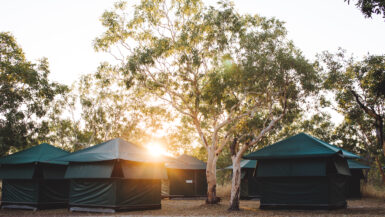Indonesia is a beautiful country with a diverse range of landscapes, from lush rainforests to pristine beaches. For those who love camping and being in nature, Indonesia offers a plethora of options. However, as we become more aware of our impact on the environment, it’s important to choose campsites that are eco-friendly and sustainable. In this article, we will explore the best eco-friendly camping sites in Indonesia, where you can enjoy the great outdoors while minimizing your impact on the environment. From eco-resorts to community-based tourism initiatives, these campsites offer a unique and responsible way to experience the natural beauty of Indonesia.
Introduction to Eco-Friendly Camping and Its Benefits
Camping is an excellent way to connect with nature and experience the great outdoors. However, traditional camping practices often leave behind a negative impact on the environment. In recent years, the concept of eco-friendly camping has gained popularity, emphasizing sustainable practices that minimize harm to the environment.
Eco-friendly camping, also known as green camping, involves using eco-friendly products, minimizing waste, and reducing carbon footprint. It is a way of camping that promotes responsible tourism and encourages campers to leave no trace behind.
The benefits of eco-friendly camping are numerous. Firstly, it helps to preserve the natural beauty of the environment by minimizing waste and pollution. Secondly, it promotes sustainable tourism and encourages campers to be responsible and respectful towards the environment. Finally, eco-friendly camping provides a unique and authentic camping experience that allows campers to connect with nature in a meaningful way.
In Indonesia, eco-friendly camping is becoming increasingly popular, with many campsites adopting sustainable practices. In the following sections, we will explore the best eco-friendly camping sites in Indonesia and highlight their unique features and sustainability practices. We will also provide tips for responsible camping and discuss the challenges and opportunities for eco-friendly camping in Indonesia.
Overview of Indonesia’s Natural Beauty and Camping Culture
Indonesia is an archipelago of over 17,000 islands, home to a diverse range of flora and fauna, including some of the world’s most beautiful beaches, mountains, and rainforests. The country’s natural beauty provides an ideal setting for camping, with many campsites offering breathtaking views and unique experiences.
Camping has been a part of Indonesian culture for centuries, with many locals regularly camping in the countryside or on the beach. In recent years, camping has become increasingly popular among tourists, with many seeking to explore Indonesia’s natural beauty and experience authentic local culture.
One of the most popular types of camping in Indonesia is beach camping. With over 54,000 kilometers of coastline, Indonesia offers an abundance of stunning beaches, many of which have designated camping areas. Beach camping in Indonesia provides an opportunity to sleep under the stars, listen to the sound of the waves, and wake up to a beautiful sunrise.
Another popular type of camping in Indonesia is mountain camping. Indonesia is home to some of the world’s most beautiful mountains, including Mount Bromo, Mount Rinjani, and Mount Merapi. Mountain camping provides an opportunity to experience the breathtaking views and unique landscapes of Indonesia’s mountains.
Indonesia’s camping culture is deeply rooted in nature and sustainability. Many locals practice eco-friendly camping, using natural materials and minimizing waste. With the rise of eco-tourism in Indonesia, many campsites are now adopting sustainable practices, such as using solar power, composting toilets, and recycling facilities.
In the next section, we will discuss the criteria for selecting eco-friendly camping sites in Indonesia, to help you choose the best campsite for your next eco-friendly camping adventure.
Criteria for Selecting Eco-Friendly Camping Sites in Indonesia
When selecting an eco-friendly campsite in Indonesia, it is essential to consider several factors to ensure that you choose a campsite that aligns with your values and supports sustainable practices.
1. Sustainability Practices: The first factor to consider when selecting an eco-friendly campsite is the sustainability practices of the campsite. Look for campsites that use renewable energy sources, have composting toilets, and recycle facilities.
2. Location: The location of the campsite is another important factor to consider. Choose a campsite that is located in a natural setting, away from urban areas, and close to hiking trails or other outdoor activities.
3. Size: The size of the campsite is also an important factor to consider. Choose a smaller campsite that has fewer campsites to minimize the impact on the environment and promote a more intimate camping experience.
4. Wildlife Conservation: The campsite’s approach to wildlife conservation is another important factor to consider. Choose campsites that have policies in place to protect wildlife and their habitats.
5. Responsible Waste Management: Choose a campsite that has responsible waste management practices in place. Look for campsites that encourage campers to pack out their trash and provide recycling facilities.
By considering these factors, you can choose an eco-friendly campsite that aligns with your values and supports sustainable practices.
In the next section, we will discuss the top eco-friendly camping sites in Indonesia, including their unique features and sustainability practices.
Top Eco-Friendly Camping Sites in Indonesia, Including Their Unique Features and Sustainability Practices
Indonesia offers an abundance of eco-friendly camping sites that provide a unique and authentic camping experience. Here are some of the top eco-friendly camping sites in Indonesia, including their unique features and sustainability practices:
1. Gili Meno Eco Hostel, Lombok
Located on the beautiful island of Gili Meno in Lombok, Gili Meno Eco Hostel offers a unique camping experience in eco-friendly accommodation. The hostel is made entirely from recycled materials, and the electricity is generated by solar power. The hostel also has a composting toilet and a recycling facility.
2. Green Camp Bali, Bali
Green Camp Bali is an eco-friendly campsite located in the heart of Bali’s rainforest. The campsite offers a variety of camping experiences, including bamboo tent camping and luxury safari tent camping. The campsite has composting toilets, recycling facilities, and a solar-powered shower.
3. Kampoeng Inggris, Bandung
Kampoeng Inggris is an eco-friendly campsite located in Bandung, West Java. The campsite offers a unique camping experience, with campsites located in the middle of a tea plantation. The campsite has composting toilets, recycling facilities, and a solar-powered shower.
4. Surya Shanti Villa, Bali
Surya Shanti Villa is an eco-friendly campsite located in Bali’s rice fields. The campsite offers a unique camping experience, with campsites located in the middle of a rice paddy. The campsite has composting toilets, recycling facilities, and a solar-powered shower.
5. Bukit Lawang Jungle Camp, Sumatra
Bukit Lawang Jungle Camp is an eco-friendly campsite located in the heart of Sumatra’s rainforest. The campsite offers a unique camping experience, with campsites located in the middle of the jungle. The campsite has composting toilets, recycling facilities, and a solar-powered shower.
These eco-friendly camping sites in Indonesia offer a unique and authentic camping experience while promoting sustainable practices. By choosing to camp at these sites, you can support responsible tourism and minimize your impact on the environment.
Tips for Eco-Friendly Camping in Indonesia, Including Responsible Waste Management and Conservation Practices
Camping in Indonesia provides a unique opportunity to connect with nature and experience the country’s natural beauty. However, it is essential to practice responsible camping to minimize your impact on the environment. Here are some tips for eco-friendly camping in Indonesia:
1. Choose Eco-Friendly Camping Sites
Choose eco-friendly camping sites that promote sustainable practices and minimize their impact on the environment.
2. Use Eco-Friendly Products
Use eco-friendly products, such as reusable water bottles, biodegradable soap, and eco-friendly insect repellent.
3. Minimize Waste
Minimize waste by packing out all trash and using reusable containers and utensils.
4. Practice Responsible Wildlife Viewing
Practice responsible wildlife viewing by observing animals from a distance and not disturbing their habitat.
5. Respect the Environment
Respect the environment by staying on designated trails, not damaging plants, and not leaving any traces behind.
6. Conserve Water and Energy
Conserve water and energy by taking short showers, turning off lights when not in use, and using solar-powered chargers.
By following these tips, you can minimize your impact on the environment and promote sustainable camping practices in Indonesia.
In the next section, we will discuss the challenges and opportunities for eco-friendly camping in Indonesia, and how we can promote sustainable tourism in the country.
Challenges and Opportunities for Eco-Friendly Camping in Indonesia
While eco-friendly camping in Indonesia is gaining popularity, there are still several challenges that need to be addressed to promote sustainable tourism in the country.
1. Lack of Awareness
One of the biggest challenges is the lack of awareness about sustainable camping practices among tourists and locals. Many people are unaware of the impact of traditional camping practices on the environment and the benefits of eco-friendly camping.
2. Limited Infrastructure
Another challenge is the limited infrastructure for eco-friendly camping in some areas. Many campsites lack proper waste management facilities and renewable energy sources, making it difficult to adopt sustainable practices.
3. Cultural Barriers
Cultural barriers can also be a challenge for promoting eco-friendly camping in Indonesia. Some locals may not understand the importance of sustainable tourism or may not be willing to adopt sustainable practices.
Despite these challenges, there are also many opportunities for promoting eco-friendly camping in Indonesia.
1. Growing Interest in Sustainable Tourism
There is a growing interest in sustainable tourism among tourists and locals in Indonesia. Many people are becoming more aware of the impact of traditional tourism practices on the environment and are seeking more sustainable options.
2. Government Initiatives
The Indonesian government has also taken steps to promote sustainable tourism in the country. The government has launched several initiatives to support eco-tourism and encourage sustainable practices.
3. Innovation
Innovation is also driving the growth of eco-friendly camping in Indonesia. Many campsites are adopting new technologies, such as solar power and composting toilets, to minimize their impact on the environment.
By addressing the challenges and capitalizing on the opportunities, we can promote eco-friendly camping in Indonesia and support sustainable tourism in the country.
Conclusion and Call to Action for Promoting Sustainable Tourism in Indonesia
Indonesia is a country with diverse natural beauty, from stunning beaches to lush rainforests and towering volcanoes. Eco-friendly camping is a great way to explore this natural beauty while minimizing your impact on the environment.
By selecting eco-friendly camping sites, you are supporting sustainable tourism practices that prioritize the conservation of natural resources and the local community. These sites often implement practices such as composting, recycling, and using renewable energy sources to reduce their carbon footprint.
During your eco-friendly camping trip, it is important to practice responsible waste management by disposing of trash properly and avoiding single-use plastics. You can also contribute to conservation efforts by respecting wildlife and their habitats, and supporting local conservation initiatives.
Despite the many benefits of eco-friendly camping, there are still challenges to promoting sustainable tourism in Indonesia. One of the biggest challenges is the lack of awareness and education about sustainable tourism practices. It is crucial for tourism operators and the government to prioritize sustainable tourism initiatives and educate visitors about their impact on the environment.
As a responsible traveler, you can play a role in promoting sustainable tourism in Indonesia by choosing eco-friendly camping sites, supporting local conservation efforts, and spreading awareness about sustainable tourism practices. By doing so, you can help preserve Indonesia’s natural beauty for future generations to enjoy.





Leave a reply